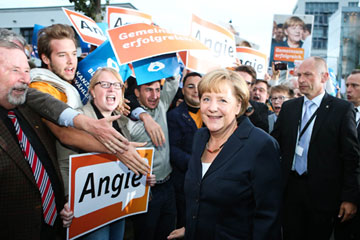
German Chancellor Angela Merkel greets her supporters outside a studio ahead of the TV debate in Berlin, Germany, Sept. 1, 2013.
(2 of 4)
Merkel's opponents hope her record of inaction will lose her the election. She seeks to counter their attacks with something rarely seen in postwar Germany — a campaign based on personality. That's all the more startling because Merkel, under close scrutiny since she took the CDU's helm in 2000, remains an enigma. More than any other Chancellor of modern times, Merkel is Germany, personifying the nation's seemingly contradictory impulses to be a world power and keep a low profile. Understand Merkel and you understand why this election matters to Europeans and economies that are dependent on European success — and why the vote, irrespective of its outcome, won't deliver the faster, more flexible Germany they want.
A Star in the East
Templin sits encircled by medieval city walls and bounded by something less tangible: a sense of small-town reserve. Curtains twitch. Strangers are immediately conspicuous. The focus on the Kasner family when they settled in this corner of the GDR with their baby daughter in 1954 was intense. They were exotic anomalies: Westerners choosing to live in the East. Not only that, but Horst Kasner was also a Protestant pastor who saw it as his mission to work in the GDR and so lived under constant suspicion of sedition.
Angela Kasner — people who have known her since childhood pronounce her name not with a hard G but softly, Ong-uh-lah — learned to blend in to the point of near invisibility. In school photos, a waning crescent of cheek or glimpse of pudding-basin haircut are the only signs that the future Chancellor was actually present. Her flat-footed running style appears to have been distinctive enough to remain in the memory ("She was about as unsporty as it's possible to be," says Carola Moock, her contemporary at school and now a pediatrician), but otherwise, apart from one pivotal, traumatic moment, Kasner stood out only for her scholarship.
She took gold at a regional mathematics olympiad, an annual competition pitting schoolkids against one another in academic subjects. She twice won the top prize for Russian at the olympiad. Erika Benn, the teacher who coached her to victory, says her star pupil easily mastered the language but struggled to acquire the interpersonal skills to sell a Russian poem. "She wouldn't even look up," says Benn. "I said to her, 'Can't you smile a bit?'"
It may seem counterintuitive that a girl without natural social skills should grow up to beguile so many, but you only have to see Merkel's fans gathered in Recklinghausen to appreciate the affection she inspires. "I find her wonderful, not just as a politician but a strong woman," says Jil Schulden, 19, a recent high school graduate. Such sentiments are commonplace in Germany and across a wide demographic.
There are criticisms, certainly. The Chancellor has acquired several nicknames: "Merkiavelli" and "the Black Widow," for her ability to sidle up unnoticed before delivering a deadly bite. To her supporters, she's Angie. But everyone in Germany knows her as "Mutti," mommy.
For many Germans, it's an endearment and a reflection of their lingering surprise that they put Merkel in charge in the first place. When she ran for the chancellorship in 2005, "the main question in the campaign was 'Kann die das?' Is she able to do this? With a negative touch. Nobody is asking that anymore," says Ursula von der Leyen, who has served as a minister in both Merkel governments.
If Merkel is a unifier more than a polarizer, that may be because her life intertwines the strands of a country that was formed as recently as 1871, torn by two world wars and stitched back together less than 23 years ago. Nor did the transformations stop with reunification, which gave impetus to Germany's reinvention as a more relaxed, tolerant nation.
Merkel's "very Protestant, very Prussian" family, as de Maizière remembers the Kasners, instilled a profound work ethic in their eldest daughter and ambitions that appeared to have limited room for expression. West German women tended to stay at home. East Germans faced different barriers.
